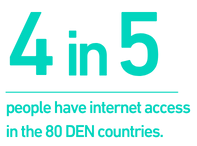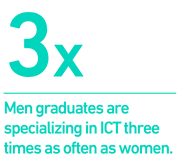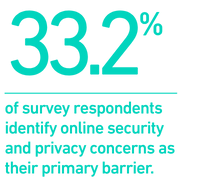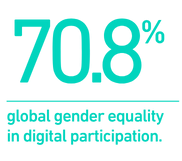The DEN 2025 Report
Data-driven strategies for advancing digital economy resilience and social prosperity
Download the full reportThe digital economy continues to evolve rapidly. Its impact across countries and societies is profound, offering significant opportunities for development and prosperity.
The challenge is to shape its evolution toward achieving inclusive, sustainable, and resilient economic growth that enables shared digital prosperity for all. Global cooperation is crucial to achieving a world in which every country, business, and person has a fair opportunity.  That cooperation must be underpinned by a data-driven framework that keeps pace with rapid change.
That cooperation must be underpinned by a data-driven framework that keeps pace with rapid change.
The DEN 2025 rises to the challenge by delivering comprehensive coverage of the maturity of the digital economy across 80 countries, representing 85% of the global population and 94% of global GDP. Its evidence base comprises 145 indicators drawn from the most reputable and peer-reviewed international data sources, and from an online global survey built for this report that covers over 41,000 respondents.
Digital divides are closing, but progress remains fragile
 The DEN 2025 tells a story of cautious optimism. The digital economy is becoming a shared reality across the world. Internet access now reaches more than four in five people in the 80 countries covered by the DEN. Nearly all of those who are connected use digital platforms to stay in touch with family and friends, manage finances, and access health and education services.
The DEN 2025 tells a story of cautious optimism. The digital economy is becoming a shared reality across the world. Internet access now reaches more than four in five people in the 80 countries covered by the DEN. Nearly all of those who are connected use digital platforms to stay in touch with family and friends, manage finances, and access health and education services.
About a fifth of the working-age population in the 80 countries covered by the DEN use digital tools and resources for work tasks every day. This indicates the broad-ranging reach of the digital economy and a strong potential for further growth.
Countries across all income level groups are proving that it is possible to climb the digital ladder and create opportunities for their populations. Comparing the DEN 2025 with the DEN 2024 shows that lowermiddle- income countries have made the greatest progress: they averaged a net improvement in 16 of the DEN indicators, more than the average for high-income (11), upper-middle-income (6), and low-income countries (5). Gaps are narrowing fastest in infrastructure, skills, governance, and finance—areas that create a strong foundation for the future development of the digital economy. This shows that digital divides need not be permanent.
However, the DEN 2025 results show that divides remain significant.  High-income economies score highest in most DEN indicators. People living in rural areas and lower-income countries, older generations, and women are all less likely to participate in the digital economy. According to UNESCO, only about 3.1% of women graduates specialize in fields relating to information and communication technologies (ICT), compared with 9.6% of men, limiting women’s ability to participate in advanced digital jobs.
High-income economies score highest in most DEN indicators. People living in rural areas and lower-income countries, older generations, and women are all less likely to participate in the digital economy. According to UNESCO, only about 3.1% of women graduates specialize in fields relating to information and communication technologies (ICT), compared with 9.6% of men, limiting women’s ability to participate in advanced digital jobs. 
There are large potential payoffs to closing these gaps. For example, over 1.3 billion more people could benefit from digital banking if they were connected to the internet. The digital economy around the world has strong potential for further growth if the right conditions are put in place.
The DEN 2025 provides evidence that digital development can follow different pathways. For example, while high-income countries tend to have a notable lead in infrastructure and business ecosystems, some middle- and lower-income countries are performing very well in social and sustainability aspects. However, it also shows that progress is fragile if challenges remain unaddressed.
Digital Business and building trust are key priorities
Countries are generally doing better at using technologies to achieve societal benefits than building competitive business sectors. The DEN 2025 pillars in the Digital Society dimension have the highest average scores, while pillars in the Digital Business have the lowest. Meanwhile, Digital Enablers sits in the middle, featuring a wide distribution of countries in that dimension. This means that, while the foundations for the digital economy generally exist and many people consume digital services, fewer produce and profit from them.
Despite the strong benefits of being online, a lack of confidence in digital systems could undermine progress. Then DEN 2025 survey respondents were most likely to identify online security and privacy concerns (33.2%) as their primary barrier, followed by a lack of trust in online financial services (21.7%). Survey respondents report encountering a threat such as a virus or phishing on average every four months.
Then DEN 2025 survey respondents were most likely to identify online security and privacy concerns (33.2%) as their primary barrier, followed by a lack of trust in online financial services (21.7%). Survey respondents report encountering a threat such as a virus or phishing on average every four months.
With cyber safety concerns on the rise, DEN data show that individuals are improving data protection skills in almost all countries—but also that more efforts are needed to prevent individual cyber incidents. As AI applications continue to be rapidly deployed, the DEN 2025 notes that AI governance remains an area for improvement in digital economy development.
New developments are shaping the digital economy
The DEN 2025 further expands the framework with a new pillar on the impact of digital technologies on environmental sustainability. This reflects the growing recognition that the digital economy must advance in ways that are not only inclusive but also sustainable. Digitalization is both a driver of environmental solutions and a source of new challenges— including from energy consumption, mineral resources, and e-waste—making it vital to measure its impact.
On sustainability, the results show that progress is not tied to income levels, with high-income economies only slightly ahead of others. Shared mobility is also widely adopted, with 84.3% of DEN survey respondents across the 80 DEN countries reporting participation.
To capture the rapidly evolving and interconnected nature of the digital economy, DEN 2025 introduces three cross-cutting themes that highlight areas of elevated importance in today’s digital economy: AI and emerging technologies, cross-border flows, and gender equality.
AI is progressing rapidly but unevenly, with advanced economies consolidating their lead, while regions such as South Asia and Sub-Saharan Africa show strong potential for rapid advancement.
The digital transformation has facilitated cross-border trade, with online service portals being fully implemented in 66 of the 80 countries covered by the DEN, and implementation underway in another ten countries. However, additional efforts are needed to ease restrictions on the trade in ICT goods to enable affordable access to digital devices.
 Global gender equality in digital participation averages a relatively strong 70.8%, although results vary widely across regions. Encouragingly, some countries in emerging regions show high levels of digital participation among women.
Global gender equality in digital participation averages a relatively strong 70.8%, although results vary widely across regions. Encouragingly, some countries in emerging regions show high levels of digital participation among women.
These improvements to the DEN 2025 framework are balanced with a consistent approach that maximizes the opportunity to draw insight from comparisons across the two editions. The ten pillars from the DEN 2024 are retained, as is their categorization into three dimensions: Digital Enablers (Digital Infrastructure, Digital Capabilities, Digital Policy and Governance, and Digital Finance); Digital Business (ICT Core Business, Industry Digital Transformation, and Digital Innovation); and Digital Society (Digital for Health and Education, Digital for Work and Training, Digital for Social Inclusion, and Digital for Sustainability, the latest dimension).
More about the DEN 2025
- Read DCOs announcement of the 2025 DEN
- Explore the updated 2025 Digital Economy Navigator
- Read about the DEN Methodology
More about the DEN 2024